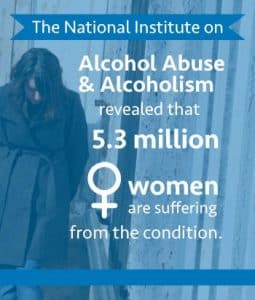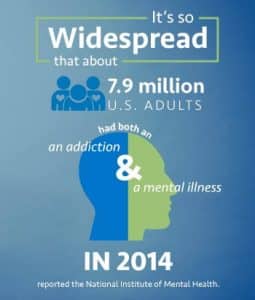No one is immune to the dangers of alcohol and drug addiction. Substance use disorder sees no age, race, color, or gender. When it comes to women, statistics from 2016 reveal that about 19.5 million females aged 18 years old and older used illicit drugs in the previous year.
According to the same statistics, 8.4 million females aged 18 years old and above misused prescription drugs. The numbers are alarming, more so because the figures quadrupled from 1999 to 2014. They illustrate how drug rehab for women is a necessity.
Women and Addiction
Studies have shown how substance use disorder among women can lead to problems with menstruation, fertility, pregnancy, breastfeeding, and menopause. People misuse drugs and alcohol for various reasons. The reasons include fighting exhaustion, controlling weight, treating mental health issues, and coping with feelings. Professionals at women’s rehab centers address these issues as well as their clients’ substance use disorder.
The above statistics demonstrate just how widespread the problem is. While demographic studies reported that women previously had low rates of heroin use, recent figures state that the number of women using heroin has increased.
Many women also have alcohol use disorder. The National Institute on Alcohol Abuse and Alcoholism revealed in 2019 that 5.5 million women are suffering from the condition. These numbers have paved the way for the establishment and existence of women-only rehab centers.
Why Is Drug Rehab for Women Important?
 Every person with addiction needs help. But there are unique needs among women that may make them good candidates for women’s drug rehab centers. Staying in facilities that cater to drug rehab for women means that the centers are addressing their specific needs. Treatments that work with men may not yield the same results in women.
Every person with addiction needs help. But there are unique needs among women that may make them good candidates for women’s drug rehab centers. Staying in facilities that cater to drug rehab for women means that the centers are addressing their specific needs. Treatments that work with men may not yield the same results in women.
Drug rehab for women employs approaches that consider the context of a woman’s life, such as her social and economic environment, her relationships with her loved ones, peers, and other support systems, and the impact of culture and gender. It also utilizes gender-responsive treatment, as gender differences can contribute to patterns of substance use disorder.
Certain factors contribute to substance use disorder in women, including stress, grief, strain in relationships, and mental illnesses such as post-traumatic stress disorder (PTSD), eating disorders, anxiety, and depression. Women-only rehab centers acknowledge these factors and how they influence women’s lives.
Unique Treatment at Women’s Rehab Centers
One of the biggest benefits of attending drug rehab for women is the opportunity to pursue unique treatments specifically for women. Rehab centers offer safety and security.
Safe environments are especially important since a considerable number of women with addiction developed the condition due to trauma from sexual abuse or violence.
Drug rehab for women offers a safe zone that helps women feel comfortable, encouraging them to open up about these experiences so they can deal with them. This sense of safety offers a nurturing environment where women can rely on each other for support.
There are also personalized treatments that specifically cater to issues that women face. Such approaches include domestic violence/emotional abuse therapy, where people process their experiences and heal the hurt that the experiences have caused. The same is also true for sexual abuse trauma therapy. Sharing common experiences make it easier for many to discuss their experiences, work through the feelings associated with them, and move forward from them.
Eating/body image therapy is another component of other women-only rehab centers and programs. Some women suffer from body image issues, which may lead to eating disorders. Facilities offering drug rehab for women acknowledge body image issues and help women resolve them with individual and group counseling.
Family-based treatment is another form of assistance that helps women with substance use disorders. It involves members of the clients’ families and aims to strengthen family relationships to help people become sober.
What to Expect at Drug Rehab for Women
If people attend women’s rehab centers, here are some things they may experience:
Intake
After contacting the drug rehab for women of their choice, people will participate in initial assessments of their conditions. Their assessments may include participating in interviews and answering questionnaires. Professionals then collect the data and use it to develop treatment plans that cater to their clients’ specific needs.
Detox
Many regard this stage as the hardest part of the process, as this procedure removes addictive substances from the body. Withdrawal symptoms are common during detox, but women’s rehab centers have licensed and certified personnel who help people proceed through this stage more safely and comfortably.
Treatment
One goal of this part of drug rehab for women is to try to change behaviors and attitudes so participants can move forward with their lives. These changes also teach people ways to remain sober after rehabilitation. Treatment may include group, individual, or family therapy, types of therapy that involve art or animals, sobriety group meetings, and other treatment protocols.
Aftercare
People’s challenges do not end after they complete drug rehab for women. To prevent relapses from sobriety, it is important to create an aftercare program. This is to ensure that people remain on the right track after leaving women-only rehab centers.
Treatment Options at Rehab Centers
At centers that offer drug rehab for women, many of the following treatment options are available:

- Dual diagnosis treatment – Dual diagnosis treatment explores factors that may contribute to addiction. Women-only rehab centers examine how addiction is connected to traumatic events, life experiences, and mental health issues.
- 12-step programs – The programs require participants to surrender to a higher being and make amends for problems that they have caused.
- Non 12-step programs – This drug rehab for women treatment option is secular and evidence-based to help people stay away from drugs and alcohol.
- Holistic approaches – Holistic options focus on healing the mind, body, and spirit to achieve recovery. They treat the entire person, not just his or her addiction.
- Faith-based rehab – Drug rehab for women facilities utilizing this option seek to strengthen a person’s relationship with God to achieve long-term sobriety.
Paying for Drug Rehab
Many opt not to enter a drug rehab for women because of the price tag that comes with it. However, the price of rehab should not be a barrier to seeking assistance.
The Affordable Care Act has aimed to make drug rehab for women more accessible. It has expanded health coverage and views substance use disorder treatment similar to other types of medical treatment.
People seeking substance use disorder treatment can also use their savings to receive the kind of treatment they deserve. They may consider asking their loved ones and support systems to help them pay for rehab.
If the above options are not available for you, there are banks and other lending institutions that may give you loans specifically for your health care. As another option, you can also use cash or your credit card to pay for your stay at a drug rehab for women facility. Private organizations also give scholarships to help people finance their care. Treatment and ways of paying for treatments are available.
Sources
Medical disclaimer:
Sunshine Behavioral Health strives to help people who are facing substance abuse, addiction, mental health disorders, or a combination of these conditions. It does this by providing compassionate care and evidence-based content that addresses health, treatment, and recovery.
Licensed medical professionals review material we publish on our site. The material is not a substitute for qualified medical diagnoses, treatment, or advice. It should not be used to replace the suggestions of your personal physician or other health care professionals.







